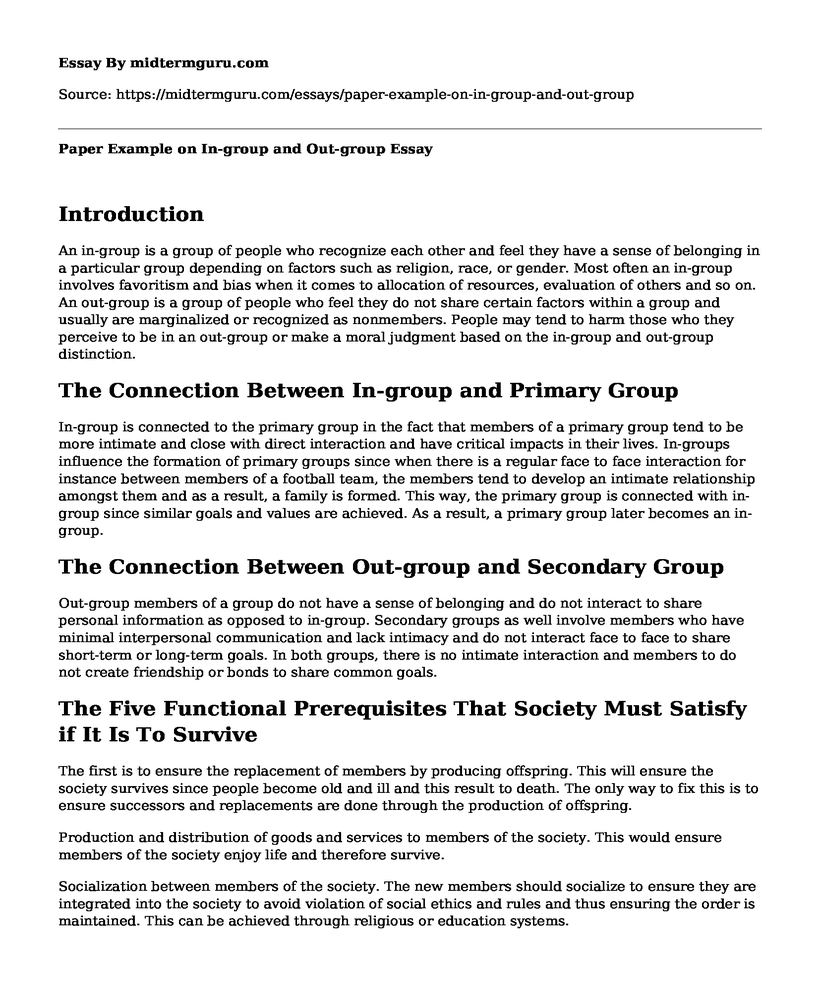Introduction
An in-group is a group of people who recognize each other and feel they have a sense of belonging in a particular group depending on factors such as religion, race, or gender. Most often an in-group involves favoritism and bias when it comes to allocation of resources, evaluation of others and so on. An out-group is a group of people who feel they do not share certain factors within a group and usually are marginalized or recognized as nonmembers. People may tend to harm those who they perceive to be in an out-group or make a moral judgment based on the in-group and out-group distinction.
The Connection Between In-group and Primary Group
In-group is connected to the primary group in the fact that members of a primary group tend to be more intimate and close with direct interaction and have critical impacts in their lives. In-groups influence the formation of primary groups since when there is a regular face to face interaction for instance between members of a football team, the members tend to develop an intimate relationship amongst them and as a result, a family is formed. This way, the primary group is connected with in-group since similar goals and values are achieved. As a result, a primary group later becomes an in-group.
The Connection Between Out-group and Secondary Group
Out-group members of a group do not have a sense of belonging and do not interact to share personal information as opposed to in-group. Secondary groups as well involve members who have minimal interpersonal communication and lack intimacy and do not interact face to face to share short-term or long-term goals. In both groups, there is no intimate interaction and members to do not create friendship or bonds to share common goals.
The Five Functional Prerequisites That Society Must Satisfy if It Is To Survive
The first is to ensure the replacement of members by producing offspring. This will ensure the society survives since people become old and ill and this result to death. The only way to fix this is to ensure successors and replacements are done through the production of offspring.
Production and distribution of goods and services to members of the society. This would ensure members of the society enjoy life and therefore survive.
Socialization between members of the society. The new members should socialize to ensure they are integrated into the society to avoid violation of social ethics and rules and thus ensuring the order is maintained. This can be achieved through religious or education systems.
Incorporation of leaders and power to ensure the order is maintained. This is achieved through incorporation of police officers and defense forces to protect the society from external attackers.
For a society to survive, members must have a common goal. Members should sacrifice for the well being of the whole society as opposed to an individual interest which in most cases is the case.
Differences between Organic and Mechanical Solidarity
Mechanical solidarity involves bonds created because of similarities among individual member. Examples are students studying in an institution or church member attending the same church and sharing same beliefs. Organic solidarity comes as a result of individual members depending on each other for certain favors. An example is when people work together because they need to be complemented from either of their fellows.
Cite this page
Paper Example on In-group and Out-group. (2022, Oct 05). Retrieved from https://midtermguru.com/essays/paper-example-on-in-group-and-out-group
If you are the original author of this essay and no longer wish to have it published on the midtermguru.com website, please click below to request its removal:
- Essay on Stereotypes and Racism in Society
- Race Stereotypes - Sociology Essay Example
- Essay Sample on Abusive Relationships
- The Truth behind Gender Violence in Albania - Essay Sample
- Globalization: Integration of Economies & Societies - Research Paper
- Exploring the Fascinating World of Social Media: A Journey of Discovery - Essay Sample
- Critical Essay on Gender Roles in the Great Gatsby







